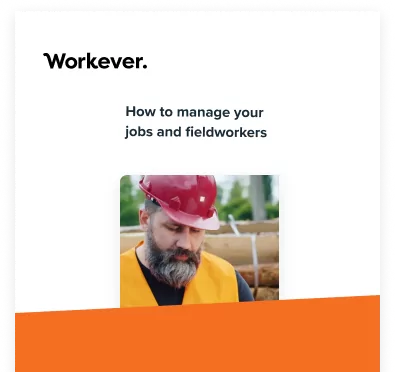We often think we can manage by ourselves. However, when the growing amount of work means disappointing clients or losing custom, it can seriously impact your business. We understand that many businesses are reluctant to grow a team. It can be a challenge and take time. However, not growing your team can be hindering your business growth and success.
The Trade Skills Shortage
Many trade businesses have found recruitment a challenge in the last few years. It is not easy to find highly skilled tradespeople. In fact, the Federation of Master Builders said that 40% of the 15 main trades monitored by the federation have reported shortages.
Furthermore, more than 37% of clients have struggled to book a tradesperson when they needed one and 58% believe there is a shortage of tradespeople.
So, when you consider the challenges of hiring a skilled tradesperson to join your team, it may make more sense to look for an alternative solution. One promising option is to hire an apprentice. Apprenticeships offer a multitude of benefits from increasing your productivity with a committed team player to tackling the skills shortage, tailoring the support you need and being an affordable way to scale your business.
So, if you’re considering expanding your team with an apprentice, this quick-start guide can help you hire your first apprentice.
How To Hire An Apprentice
Is An Apprentice Right For You?
Before setting out your recruitment plan, it is important to determine whether it is the right time to take on an apprentice. Some key questions to ask before hiring include:
- Can you afford to pay an apprentice?
- Do you need more support to take on more work?
- Do you have the time, patience and capabilities to support and train an apprentice?
Taking on an apprentice is a fantastic way to train them to follow your unique working style. However, if you don’t have the right support in place for your apprentice to learn, you may risk ruining your reputation.
For some businesses, there may be another key question to consider, which is:
- Is the business eligible for government support with apprenticeships?
If you’re looking for support when hiring an apprentice, you can find government advice here.
Know Your Obligations
An apprentice offers many benefits. However, as the employer, there will be expectations for you to fulfil too.
1. Wages
There is a minimum wage to pay an apprentice, so it is crucial that you pay at least the minimum wage as dictated by law.
2. Employee Rights
An apprentice will receive the same employment rights as any other employees in your team. For example, they will have the same health and safety protections under the law and have legal rights that you will need to enforce.
3. Training Accreditations
As an employer, you will be responsible for training your apprentice to work professionally, safely, and competently. Training your apprentice with the necessary accreditations will be essential for ensuring they are certified to work to a high standard that is befitting of your business. What’s more, under UK apprenticeship law, all apprentices must be enrolled in an appropriate training programme with an official training organisation.
4. Recognition
Many employers offer a graded pay scale to their apprentices based on the completion of qualifications. It is important to consider how you will reward and recognise your apprentices as they complete qualifications, learn new skills, and become a key part of your team. This doesn’t necessarily mean a pay increase, but it is important to recognise their progression and how valuable their skills are to your business.
Understand Your Requirements
Once you know what your obligations are to the apprentice, it is time to consider what you are looking for, so you can create the best job description.
Things to consider:
- Are you looking for a minimum level of experience?
- What personality traits would be a good match for your team?
- What career opportunities for your apprentice could there be?
- Will your business structure change with an apprentice?
- What would a typical day look like for your apprentice?
Create Your Apprentice Job Description
Once you’ve understood the training, financing and support for your apprentice, and know what you’re looking for, you can begin to draft your job description. Remember, if you want to attract the right people, your job description needs to shine.
A quick search will bring up many apprentice job descriptions. You’ll quickly see how uninspiring these can be. Often, they all look like copies of each other. If you want to attract the best candidates, then you’ll want your job description to stand out.
Use your business’ personality to make your job description reflect your company ethos and personality. You can use humour, innovation or your brand message to craft a unique description.
Within the job description, you’ll want to include:
- A catchy engaging heading
- A company bio
- Incentives to join the business
- Who you’re looking for
- Tasks and responsibilities
- Opportunities and career progression
- How to apply (CV, application form, video upload, portfolio etc.)
Where To Advertise
Once you’ve crafted a job description that accurately reflects the role and makes your brand shine, the next step is to advertise for the position.
You can use your advert on:
- Your website (add a ‘we’re hiring’ banner to your pages to attract attention)
- Social media pages (ask friends to share your post for a wider reach)
- Your trade association
- Through apprenticeship job boards
- On general job boards (there can be a fee for this).
Interviewing And Recruiting
Before you interview, it is important to screen applications and create a shortlist. You’ll want to save time by only interviewing the right candidates. Fortunately, you can tell a lot from a CV. Volunteer experience, enthusiasm and commitment to projects (or jobs) can reflect the type of person they are.
Remember, apprentices are often young, so they may not have a great deal of professional or paid experience. However, they may have transferable skills and conducted volunteer work that can showcase a positive attitude to work.
If you’re not sure, it can help to have a quick phone call where you can gauge more about the individual.
Once you’re happy with your candidate shortlist, you can start to arrange interviews.
Key skills to look for:
- Technical skills – Do they have any technical know-how or researched the role?
- Customer skills – Would you feel comfortable with them being in a customer-facing role?
- Sales appeal– Could they provide quotes, cross-sell, offer recommendations or upsell for the business?
- Communication skills – Can they listen to instructions and feel comfortable sharing their thoughts or asking questions?
- Proactive – Would they be able to take initiative, offer solutions or work efficiently without constant instruction?
- Integrity – Health and safety is essential to your business. Do they understand its importance and make sure not to cut corners?
- Reliability – Will they turn up on time, be keen and ready to work with willingness and enthusiasm to learn?
- Physicality – Are they healthy and capable to work?
- Team player – Often, it is the team players that create the best work relationship. Does the candidate look out for others, or are they focused only on themselves?
- Creativity – If you put forward various scenarios, can they come up with logical and sensible ideas and responses?
Looking out for these skills can help your find a good fit. However, for the perfect fit, it is wise to trust your instincts. Do you and the candidate have a good rapport and seem to be on the same wavelength?
Apprentice Hiring Mistakes To Avoid
There is a lot to consider when recruiting an apprentice. However, being aware of these mistakes can help to make the process run as smoothly as possible:
- Hiring too fast – Take time to choose the right person for the role. Remember, measure twice, cut once.
- Desperation – When work is overwhelming, it is easy to presume anyone will do. This can actually take more time and be a hindrance rather than a benefit to the business.
- Opposing values – It is good to look for different viewpoints, but if the values are completely misaligned, then problems usually surface quite quickly.
- Being one-way – It is easy to presume that people will be desperate for a job. However, you’ll get the best candidates and team by offering incentives and opportunities to help an apprentice thrive. This doesn’t always have to be financial rewards, but make sure to consider what benefits an employee gets by working for you. It’s all about give and take.
- Being vague – You may not have career progression mapped out but having opportunities available can be crucial. Do talk about their growth and how you can support them.
- The wrong questions – Direct questions get answers, but open-ended questions can uncover a lot more about their personality and behaviour. Example based questions can really help to uncover what it would be like to work with somebody.
- Not having a plan – Mapping out the first month for an apprentice can help them to settle in quickly. It also helps them to get up to speed, so they’re better able to support you.
Why Hire An Apprentice? 10 Key Reasons To Offer An Apprenticeship
Finally, it is important to remember the reasons why hiring an apprentice is such a worthwhile aspect of your business.
- They are willing, motivated and eager to learn
- It can be a cost-effective way to upskill your workforce
- 86% of employers say apprentices help to grow the organisation’s skills
- Apprentices can help your business to grow
- It is a positive brand value that customers will appreciate
- 78% of employers believe apprentices increase their productivity
- You can tailor their training to suit your business
- Government funding support is available
- 74% of employers say apprentices help them to improve the quality of their service
- Futureproof your business with the skills your organisation needs.

